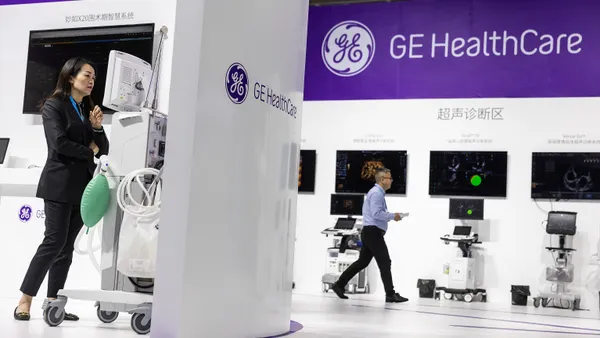Dive Brief:
- The $69 billion vertical megamerger of CVS and Aetna is official, combining the retail pharmacy powerhouse with Aetna’s health insurance business to create a mammoth healthcare entity with annual revenue of over $245 billion. Aetna will continue to operate as a standalone business under the umbrella of CVS Health.
- Together the two healthcare giants will operate more than 9,700 retail locations, more than 1,100 walk-in medical clinics and a pharmacy benefit manager with nearly 90 million members. They will also operate a health insurance plan that serves nearly 45 million Americans.
- CVS Health offerings, along with any new products or services developed by the new company, will be broadly available to consumers regardless of their insurer, and Aetna members will continue to have access to a range of pharmacies beyond CVS. The company plans to introduce new services in the next couple of months, including programs targeting chronic disease management and expanded MinuteClinic services.
Dive Insight:
The new company will operate under the moniker CVS Health and has an annual revenue second only to Walmart in the U.S. Its creation exemplifies a rapidly consolidating industry and crumbling of silos in healthcare. Some analysts the company has the potential to upend the current healthcare landscape.
"Today marks the start of a new day in health care," touted CVS Health president and CEO Larry Merlo, in a press release. He called the new company, where he'll remain at the helm, the "front door to quality health care."
The total value of the acquisition, including assumption of Aetna's debt, is $78 billion. Aetna shareholders will receive $145 in cash and 0.84 shares of CVS Health stock under the terms of the transaction.
The deal is expected to achieve $750 million in cost savings in the second year after closing.
On CVS' Q3 earnings call in early November, Merlo said the post-merger plan to integrate the two companies is "largely complete." Next year will be "highly focused on the integration of the businesses" and the establishment of the new healthcare model, according to CVS executive vice president, controller and chief accounting officer Eva Boratto.
Boratto will become CFO of the conglomerate, which will expand its board to include three additional Aetna representatives and Aetna's current CEO Mark Bertolini.
Many worry about the debt implications of the deal. Following the announcement of the merger's close, Moody's downgraded CVS Health's senior unsecured rating, and confirmed its overall ratings outlook as negative.
"The large increase in debt resulting in weaker credit metrics coupled with increased competition, reimbursement rate pressure, regulatory and political uncertainty especially pertaining to drug pricing, the high execution and integration risk and the changing landscape of the healthcare sector are key risks leading to our one notch ratings downgrade," Moody's VP Mickey Chadha said.
The merger approval process has ticked along comfortably since its December 2017 announcement, though there were a few snags. CVS and Aetna have had to fiercely rebuff allegations that the merger would result in anti-competitive behavior among pharmacy benefit managers, local health insurance markets and local retail pharmacy markets.
After receiving shareholder approval in March, the union cleared its next major hurdle mid-October when it received Department of Justice approval, conditional on Aetna divesting its standalone Medicare Part D business to a WellCare subsidiary.
The federal government's nod allowed the deal to move forward with its required 28 state approvals.
The last two states to approve, New Jersey and New York, yielded Nov. 21 and Nov. 26, respectively. New York approved following a contentious back-and-forth between CVS/Aetna execs and state regulators.













